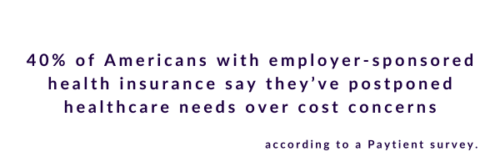Employees Face a Healthcare Crisis. Here’s How You Can Help. Employees are experiencing a healthcare crisis due to financial concerns. These are the best strategies employers can use to help.
American families are in the midst of a healthcare crisis and employer-sponsored health insurance can’t keep up. Even with support from employee health insurance programs, millions of American families cannot afford the full care they need.
When surveyed by employee experience company Perceptyx, almost 60% of respondents felt they didn’t have the right health care benefits to cover their care. Another 40% of Americans with employer-sponsored health insurance say they’ve postponed healthcare needs over concerns about cost, according to a study commissioned by health payment card provider Paytient.
Over time, postponing healthcare concerns can further decrease employees’ health and well-being. Learn how companies of sizes and across all industries can help employees access needed care, improve their overall well-being and manage the looming healthcare crises.
Even with insurance, many employees struggle with medical debt
Despite having employer-sponsored health insurance, research has shown that many employees struggle to access healthcare. Having health insurance does not guarantee access to healthcare or the ability to afford it.
Employees often pay out-of-pocket for a portion of their healthcare costs (e.g., copay or deductible). And after multiple visits or treatments, healthcare costs can rack up fast.
About 15 million people carry over $1000 in medical debt, according to the Kaiser Family Foundation (KFF) and about 3 million people carry over $10,000 in medical debt.
To avoid looming medical debt, employees may forgo key healthcare practices, such as:
- Filling their prescriptions
- Receiving surgery and procedures
- Attending a routine medical appointment or checkup
Delaying care can have long-term physical and mental impacts on employees. According to the same Paytient survey, one in six respondents reported that their work suffered from delaying needed care and 31 percent reported lying to an employer while dealing with the effects of not treating their illness or injury.
Your team deserves to feel secure that they can afford healthcare when needed — but are your benefits doing enough to help?
How to help employees manage (and prepare for) a healthcare crisis:
At some point in one’s career, many employees experience some sort of healthcare crisis. What’s important is that employees don’t feel alone while navigating these difficult waters. Here are some tips on how to help employees weather healthcare crises and prepare for the future.
- Emphasize the importance of your Open Enrollment period. Once a year, employees are given a small window known as Open Enrollment, during which time they can make changes to their healthcare coverage. For most employees, this is the only time during which such changes will be possible, aside from select special circumstances. So, when making Open Enrollment decisions, it’s important that employees know how to best utilize this period of time and the healthcare benefits available to them. Employees must be supported in making well-informed decisions during this time as these decisions determine employees’ (and their families’) healthcare coverage and costs for the year ahead. Well before the Open Enrollment period begins, spend time talking to your workers about their benefits options.
- Use modern communication methods to share key healthcare info and reminders. When communicating healthcare information and deadlines to employees, consider complementing traditional communication methods with more modern alternatives. For instance, in addition to sending employees emails and letters, use Slack or Teams messages to share reminders on key healthcare information and deadlines. Reminders, especially from multiple touch points, can be an effective catalyst to improving employee health, both during Open Enrollment and beyond. According to the Agency for Healthcare Research and Quality, adults that receive multiple reminders about their health and healthcare are more likely to receive essential healthcare, such as immunizations and preventative care. Moreover, reminders about key healthcare information can help foster trust between employees and their employer — it demonstrates corporate investment in employee wellbeing.
- Adopt a financial dashboard to help employees manage healthcare expenses. Managing healthcare costs isn’t easy. One medical emergency can dramatically change a family’s financial situation — what may seem like simple procedures and treatments can end up costing hundreds to thousands of dollars for employees. Over time, unpaid medical bills can lead to medical debt.To help employees manage their healthcare costs and avoid medical debt, consider adopting a comprehensive money management dashboard. This can help employees track, manage and predict their medical expenses and much more. With these insights, employees can better understand their healthcare spending habits and make well-informed decisions accordingly. For instance, some families may find that they can dial down their healthcare spending and use that money toward something else, such as covering a car repair or saving for a home. Others, such as those expecting a new addition to the family, may need to increase how much they budget for healthcare costs.By understanding how your employees think about their healthcare costs, companies can make more accurate predictions about their own healthcare expenses.
Help your team face any healthcare crisis head-on with help from Best Money Moves’ intuitive financial wellness platform.
Best Money Moves is an AI-driven, mobile-first financial wellness solution designed to help employees with varying levels of financial knowledge dial down their most top-of-mind financial stresses. As an easy-to-use financial well-being solution, Best Money Moves offers comprehensive support toward any money-related goal, ranging from debt management to purchasing a home. With 1:1 money coaching, budgeting tools and other resources, our AI-driven platform is designed to help bolster employee financial wellbeing.
To learn more about Best Money Moves Financial Wellness Platform, let’s schedule a call. Contact us and we’ll reach out to you soon.






